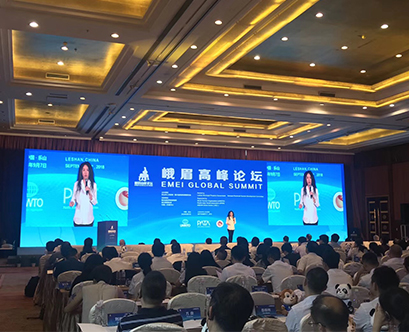
最近一项研究显示,夜猫子出现早逝、心理障碍以及患呼吸系统疾病的风险会增加,这为其它认为夜猫子更可能健康不佳的研究也提供了支撑。然而,这是否真的意味着有些人应该别再熬夜和睡懒觉而变成早起的鸟儿呢?
早睡早起好养生?

作者:Alex Therrien
译者:徐嘉茵 & Beata
校对:王津雨
策划:邹世昌
Should we sleep and wake early to boost our health?
早睡早起好养生?
本文选自 BBC | 取经号原创翻译
关注 取经号,回复关键词“外刊”
获取《经济学人》等原版外刊获得方法
When a recent study looked at health differences between late and early risers, it appeared to make grim reading for night owls.
最近一项研究观察的是晚起者与早起者健康状况差异,其结果对夜猫子型的人来说可不是好消息。
Increased risk of early death, psychological disorders and respiratory illness were the stark findings from the paper, which backed up other research suggesting late-nighters are more likely to suffer ill health.
该研究明确发现,夜猫子出现早逝、心理障碍以及患呼吸系统疾病的风险会增加,这为其它认为夜猫子更可能健康不佳的研究也提供了支撑。
But is being a night owl really bad for you and does it mean some of us should ditch the late nights and lie-ins to become more like morning larks?
但是,夜猫生活真的会对人有害?这是否又意味着有些人应该别再熬夜和睡懒觉而变成早起的鸟儿呢?
‘Social jet lag’
“社交时差”
It’s a scenario familiar to many workers during the week.
这是许多上班族在一周中熟悉不过的情景。
After struggling to fall asleep, you’re abruptly dragged out of your precious slumber by the jarring siren of the alarm clock.
当你艰难入睡后,刺耳的闹铃硬生生地把你从宝贵的睡梦中拽出来。
By the weekend you’re exhausted and sleep way past your Monday-Friday waking time to catch up on some precious sleep.
等到了周末,你已精疲力竭,通过睡觉来弥补周一至周五错失的珍贵睡眠时间。
This may sound perfectly normal but it’s a sign not only that you’re not getting enough sleep but also that you have “social jet lag”.
这或许听起来很正常,但却表明你不仅睡眠不足,而且还有“社交时差”。
This is the term for the difference between when we sleep during the week compared with the weekend, when we’re free to go to bed and get up at the times we like.
这个术语形容的是人们在工作日和周末睡觉时间的差别。在周末,我们可以随心所欲地睡觉,想什么时候起床都可以。
The bigger the social jet lag, the greater the health issues, such as increased risk of heart disease and other metabolic problems.
社交时差越大,健康问题就越严重,比如患有心脏病和其它代谢问题的风险会增加。
This is what is driving those studies that find night owls – particularly very late risers – are at increased risk of ill health compared with their morning-loving counterparts, according to Till Roenneberg, professor of chronobiology at the Institute of Medical Psychology at Ludwig-Maximilian University in Munich.
慕尼黑大学医学心理学研究所的时间生物学教授提尔·罗内伯格表示,很多研究发现,夜猫子型的人——尤其那些特别晚起的——跟喜欢早起的同辈相比,健康不佳的风险正在增加,对社交时差的发现正推动着这些研究继续进行下去。
With many jobs and schools often having early start times, night owls are effectively having to operate in morning lark time.
很多工作单位和学校通常都是早早开始运作,夜猫子型的人事实上也不得不早起去工作或者学习。
If you forced early risers to have to work late into the night they’d also face health problems, says Russell Foster, head of the Nuffield Laboratory of Ophthalmology and the Sleep and Circadian Neuroscience Institute.
如果你强迫早起的人工作到深夜,他们也会面临健康问题,纳菲尔德眼科实验室兼睡眠与昼夜节律神经科学研究所的负责人拉塞尔·福斯特如是说道。
‘It’s human biology’
“这与人体生物学有关”
So how should night owls cope?
那么,夜猫子该如何应对呢?
Should they sacrifice their lie-in on the weekend and set the alarm early to get back into sync with the time they have to operate in during the working week?
他们应该牺牲周末睡懒觉的时间,设个闹钟,跟工作日一样早起吗?
“It is the worst thing you can do,” says Prof Roenneberg, who believes there is nothing inherently unhealthy about being a night owl.
“这是最糟糕的选择,”罗内伯格教授说道,他认为做个夜猫子本身不存在什么不健康因素。
“If you haven’t slept enough for five days you’d better catch up on your sleep and you better try to catch up at your individual best time to do that, and that’s later.”
“如果你持续五天没睡够,那你最好补一下眠,并且最好是在个人的最佳时间做这件事,也就是起晚点儿。”
This is because when we want to sleep and wake is not just a habit, nor is it a sign of discipline.
这样做的原因是,想何时睡何时醒并非只是一种习惯而已,也并不是自律的一种表现。
Instead, it is influenced by our body clocks, about 50% of which is determined by our genes.
相反地,它会受生物钟影响,这种生物钟约50%是由我们的基因决定的。
The rest is shaped by our environment and age, with 20 being around the peak age of lateness and our body clock getting progressively earlier as we get older.
剩下的50%则受环境和年龄影响。20岁左右是我们晚睡状态的高峰期,随着年龄渐长,我们的生物钟也逐渐提前。
“We have these ingrained attitudes that people who stay up late must be up to no good and people who sleep in late must be lazy, but really it is human biology,” says Malcolm von Schantz, professor of chronobiology at the University of Surrey.
萨里大学研究时间生物学的教授马尔科姆·冯·山茨表示,“我们抱有根深蒂固的态度,熬夜肯定不是在做什么好事,还有晚睡的人一定就懒惰,但晚不晚睡其实和人体生物学有关”。
This results not just in larks and owls, but a spectrum of body clocks, ranging from very early to very late and others in between.
这种人体生物学的机制并非仅仅导致人们成为早起的鸟儿或夜猫子,而是让人们形成一系列不同的生物钟,包括很早起到很晚起以及处在两者之间的各种可能。
Simply getting up earlier is unlikely to override your genetic tendencies and instead will further deprive you of the sleep you’re already not getting enough of in the week, experts say.
专家表示,单纯早点起不可能改变你的基因趋向,而且,你在一周中本就没睡够,早起的做法反而会让你睡得更少。
Instead, a better way for night owls to manipulate their body clocks to be more like larks is through changing habits around when they are exposed to light.
相反,夜猫子型的人要想像百灵鸟一样地早起,更好的一种方式是改变其接受光照的习惯。
Our body clocks are influenced by the rise and fall of the sun, but many of us get little sunlight in the day and too much artificial light at night.
我们的生物钟会受日出和日落的影响,但很多人白天很少接触日光,晚上又接触过多人工光照。
This delays when we feel sleepy – a particular problem for night owls whose biology already predisposes them to lateness.
这会推迟我们想睡觉的时间——对夜猫子来说尤为严重,他们本就已经倾向晚睡。
By getting sunlight in the morning and reducing artificial light in the evening – particularly from things like phones and laptops which produce powerful blue light – we can train our body clocks to feel sleepy earlier.
早上接受日照,晚上减少接触人工光照——尤其是会发出强烈蓝光的手机和电脑等物件,这种方式可以调节我们的生物钟,让我们早点有睡意。
But it’s not an easy process for everyone, in part because many of us struggle to get enough sunlight in the day and find it hard to limit our exposure to artificial light in the evening.
但这并非对每个人来说都很容易,部分原因在于许多人白天难以获取足够的日照,晚上又难以限制所受的人工光照。
‘Task of society’
“社会的任务”
Instead, it is workplaces, schools and society more generally that need to do more to accommodate night owls, sleep experts say.
睡眠专家表示,此外,各公司、学校及广泛意义上的社会都需要采取更多行动来接纳夜猫子型的人。
At its most basic level, more employers should allow evening types to start and finish work later.
最起码雇主应当允许夜猫子型的人推迟开始和结束工作的时间。
Beyond this, Prof Foster says, it would make sense for some workplaces to let staff work hours that match their individual body clock.
福斯特教授表示,除此之外,一些工作场所如果能安排与员工生物钟相匹配的工作时间,也是行得通的。
This would boost employee performance and be a more effective way of staffing 24/7 businesses.
这能提升员工绩效,对一周全天无休的公司也更有效。
But Prof Roenneberg goes even further, arguing that society has a duty to fix the sleep-disrupting environment it has created.
不过,罗内伯格教授则有更进一步的看法,他认为社会有责任去修复其造成的扰人入眠的环境。
“It is the task of society to take care of this, the task of society to make more light in buildings, and to give less blue light to give people the possibility to watch TV without setting their clocks.”
“社会的任务就是解决这个问题,让更多自然光照入建筑物内,并且减少蓝光,让人们有可能既能晚上看电视又无需为此设闹钟让自己早起。”













